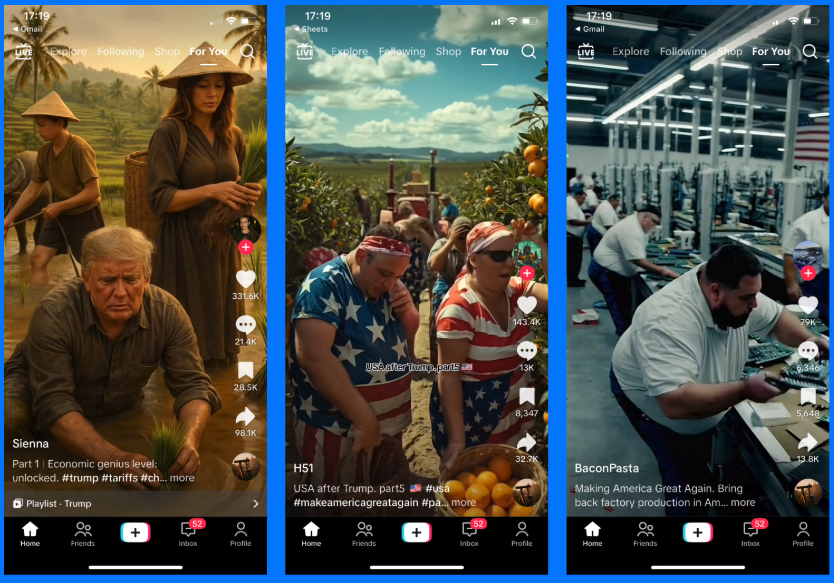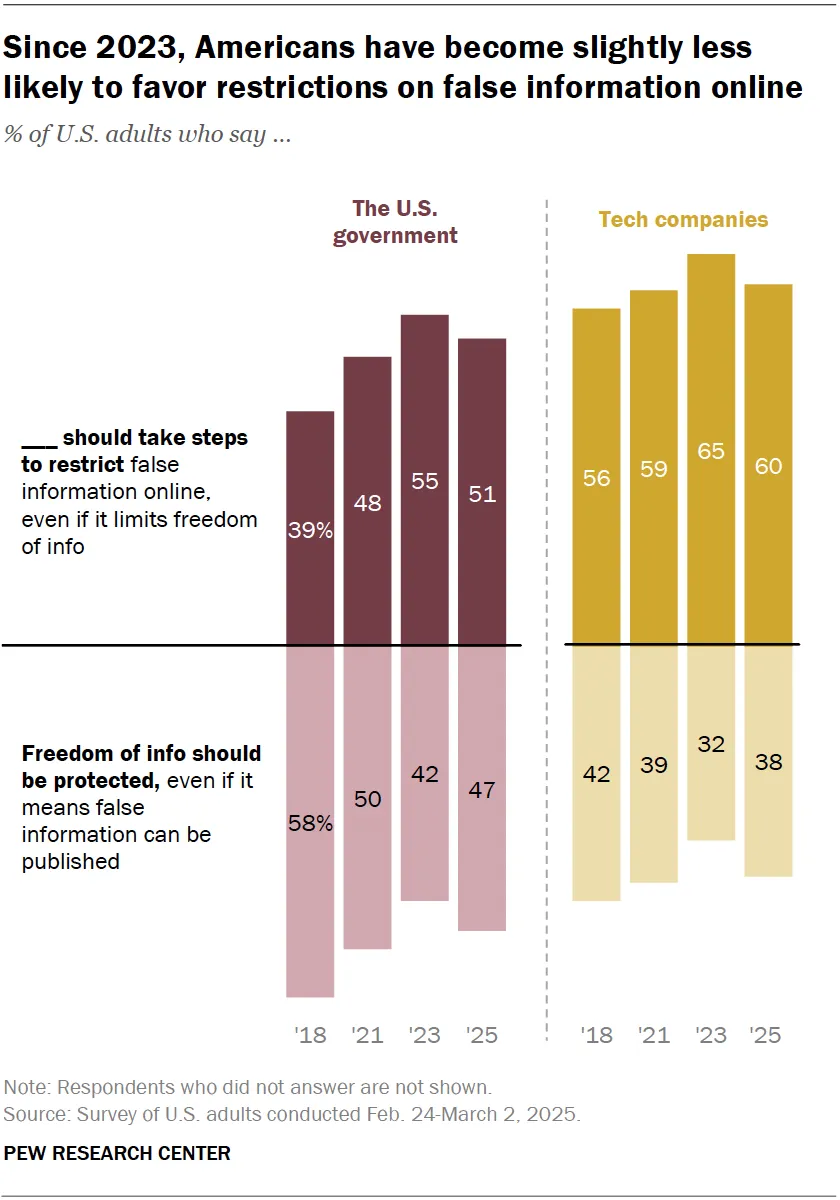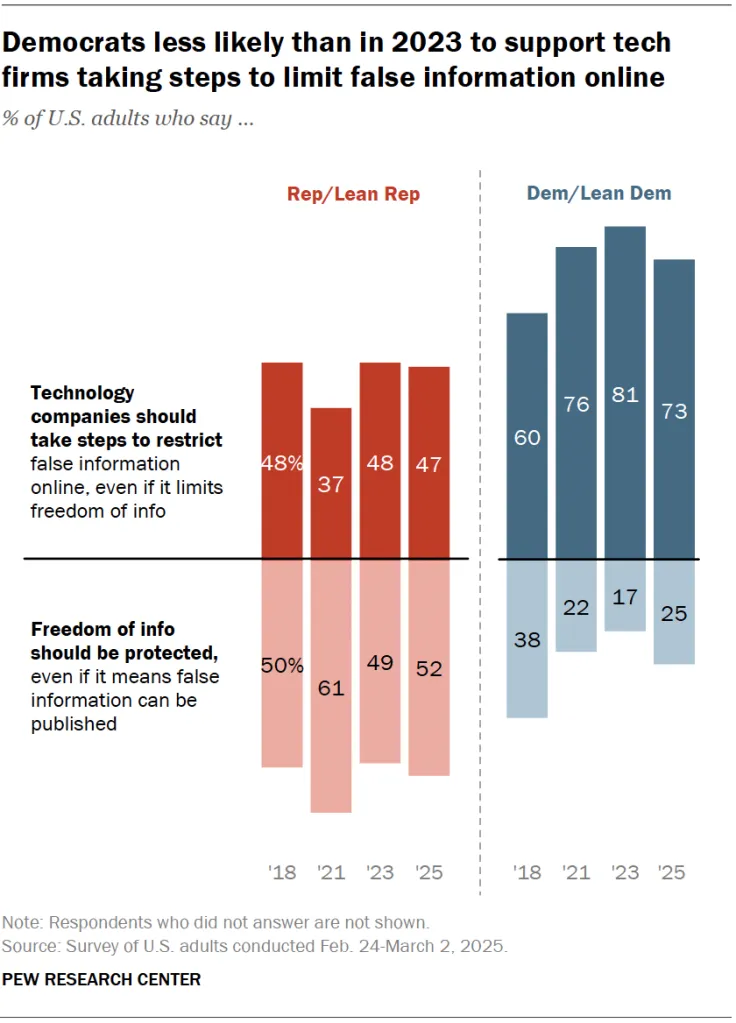NEWS
South Korean authorities received 1,384 reports of deepfake-related digital sex crimes in 2024. The European Broadcasting Union launched a new fact-checking and OSINT service. YouTube endorsed a US draft bill on deepfake impersonation. A British parliamentary investigation into the Southport riots concluded that better crisis communications is needed to fight disinformation. A Brazilian local court banned Meta from running deepfake scam ads. The CBC used ChatGPT to create a deepfake of Canada's PM dancing with Jeff Epstein. Russia's "Global Fact-Checking Network" is publishing its own articles now. A Singapore firm lost (and recovered) $494,000 because of a deepfake live video call. AI labels are not showing up on LinkedIn (I'm shook). The AI support bot of an AI "vibe coding" tool made up a policy in response to user complaints, leading to several cancellations.
TOP STORIES
Doubling down on 2020 denialism
Last week, US President Donald Trump signed two extraordinary executive orders.
The White House targeted former CISA director Chris Krebs, accusing him of "falsely and baselessly [denying] that the 2020 election was rigged and stolen." It separately targeted Susman Godfrey LLP, a law firm that represented Dominion in its lawsuit against Fox News over voting machine disinformation, for allegedly leading efforts to "degrade the quality of American elections."
Krebs has not commented beyond reiterating he was "honored to serve" and "did it right." Susman Godfrey called the executive order "unconstitutional" and has gained a temporary relief order from a judge who appears to very much agree.
As UW's Kate Starbird notes, the Krebs executive order "drives home how the 'censorship' narrative has ALWAYS been a project to 'prove' Trump's Big Lie in 2020. For researchers, platforms, and gov folks caught up in censorship accusations, no amount of ducking & covering was ever going to stop them."
The notoriously woke editorial board at The Wall Street Journal writes that "President Trump campaigned on ending lawfare and the 'weaponization' of the federal government, but he’s siccing it now on his perceived enemies by name, ordering federal investigations and potentially prosecutions. This is a broken promise, an abuse of power, and another twist down the spiral of politicized law enforcement."
One person who was pleased was MyPillow CEO and 2020 denialist Mike Lindell, who wrote on X that "we have to melt down the voting machines, turn them into prison bars and put election criminals like Chris krebs behind them!" Lindell-TV dedicated at least two hours of glowing air time to the executive order.
Extensive litigation has surfaced no evidence of pervasive voter fraud of the sort that would have affected the result of the 2020 election. On the contrary, there is undisputed audio evidence that Donald Trump tried to make Georgia's election officials "find 11,780 votes" that would win him the state.
In 2016, the first Trump administration tried and failed to find evidence of massive voter fraud. In 2024, Elon Musk's volunteer "Election Integrity Community" stopped looking for electoral malpractice when it was clear that their side had won.
But last week's executive orders go one step further. Instead of affirmatively proving that massive voter fraud took place, the administration is now seeking to make it onerous to rebut the claim.
As many as 30% of Americans tell pollsters they believe the Big Lie to be true. The FBI director has turned it into a children's book. Now the government wants to intimidate those who pushed back against it.
AI-generated videos mocking America's manufacturing prospects in the aftermath of Trump's tariff wars spread widely on Chinese social media last week.
They also did great on Western platforms like X, with one viral video allegedly getting 19 million views. That video was originally posted by user axiang67 on TikTok, where his music was reused by hundreds of other videos also mocking Donald Trump's desire to rebuild America's domestic production by imposing tariffs. (Side note: I asked ChatGPT if it could identify the track in question and it made stuff up rather than admit it didn't have the capabilities to respond.)
The videos show American workers – typically represented as overweight, aging, and slow – struggling to sew clothes, build cars, and pick crops. Other clips show Trump and his allies on the factory line or cleaning toilets under a portrait of Chinese president Xi Jinping.
In all, 21 widely-shared videos I found were seen almost 31 million times.

AI Sydney Sweeney, Dua Lipa and Anne Hathaway sell boost gummies on TikTok
An AI-dubbed TikTok ad of Sydney Sweeney endorsing Lotin Lab's "boost gummies" got more than 1.2 million views on the platform before getting taken down. The product's TikTok Shop page claims 11,400 units have been sold through the platform.
The Sweeney video, originally an interview the actress gave to British GQ, was altered to make it appear like she was describing in graphic detail a (rape-adjacent) sexual encounter with someone who had consumed the Lotin Lab gummies. I saved the video for the record here.
The account that posted the video is entirely dedicated to promoting Lotin Lab through AI-altered testimonials. I spotted Adele and Anne Hathaway in the mix; while Google Lens was of little use on most of the videos, a handful that returned results turned out to be porn stars.
Searching for "lotinlab.com" or "boost gummies", I found dozens of other TikTok accounts promoting the product with similar AI-dubbed videos and scripts.

Filipino fakes fan flames over Duterte arrest
A threat intelligence firm called Cyabra told Reuters that approximately one in three of the accounts discussing the arrest of former Filipino president Rodrigo Duterte on X were fake. They go on to note that this level of inauthentic conversation "was far above the typical 7%-10% range of online conversations globally about 'highly sensitive or polarizing' issues."
Americans still favor moderating misinformation
60% of U.S. adults told Pew Research that tech companies should take steps to restrict false information online, even if it limits freedom of information.
That's down five points compared to 2023, which is noteworthy, but still a comfortable majority. Consider too that the question's dichotomy is pretty drastic; I am among those who believe that adding context on a false post has at worst a neutral effect on freedom of information.

The dip in pro-moderation sentiment from 2023 is almost entirely driven by Democratic respondents (see below). This may be because as tech CEOs like Mark Zuckerberg brazenly cozy up to the Trump administration, left-leaning Americans feel less confident in their companies' capacity to moderate misinformation in a way they find objective.



